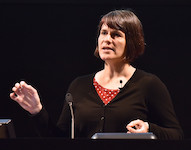Plenary Speakers

Anthony Bonato
Ryerson University, Toronto, Canada
- Title: Modeling Adversaries in Networks
- Abstract: Complex network models are often premised on the formation of edges via positive ties. However, structural balance theory in social network analysis cites several mechanisms to complete triads sharing negative ties. Real-world networks ranging from food webs to market graphs highlight the importance of modeling both positive to negative ties. We present new research on modeling friends and adversaries. The Iterated Local Model provably simulates many emergent properties of complex networks, and gives rise to graph families that are of interest in their own right. We also present a hypothesis, supported by data mined from real-world networks, characterizing the hidden structure of dynamic competition networks.
- Bio: Anthony Bonato’s research is in Graph Theory and Network Science. He has authored over 120 publications with 80 co-authors. His books A Course on the Web Graph, The Game of Cops and Robbers on Graphs, and Limitless Minds were published by the American Mathematical Society, and Graph Searching Games and Probabilistic Methods was published by CRC Press. Bonato is currently full Professor in the Department of Mathematics at Ryerson University, Editor-in-Chief of the journal Internet Mathematics, and editor of the journal Contributions to Discrete Mathematics. He has delivered over 30 invited addresses at international conferences in North America, Europe, China, and India. Bonato has supervised 17 postdoctoral fellows, five doctoral students, and 21 Masters students. He's taught undergraduate and graduate courses at Ryerson, Dalhousie, Laurier, Mount Allison, Waterloo, the National University of Ireland, and the African Institute for Mathematical Sciences in Cameroon. He served as Chair of the Department of Mathematics at Ryerson 2010-2013 and Associate Dean in the School of Graduate Studies from 2013-2017. Since 2015, Bonato serves on the NSERC Discovery Mathematics and Statistics Evaluation Group, and was the Chair for the Pure Mathematics section. Bonato’s maintains a popular blog on math in pop culture, and his words and writing were published in Salon, The Conversation, Maclean’s, and the National Post.
- Web page: http://www.math.ryerson.ca/~abonato/
 Photo credit: Mark Graham
Photo credit: Mark Graham
Catherine Greenhill
University of New South Wales, Sydney, Australia
- Title: Some recent advances in the design and analysis of sampling algorithms for graphs
- Abstract: There are many applications for algorithms which can efficiently sample graphs with given degrees. I am particularly interested in algorithms that can be rigorously analysed. One approach involves Markov chains, such as the switch Markov chain which exchanges two edges per transition. Unfortunately, the runtime bounds which we can obtain using current methods, while polynomial, are far from practical. I will discuss some recent advances, including efforts to broaden the class of degree sequences where polynomial runtime can be proved, or to unify known results. Another direction restricts the allowed transitions in order to maintain a desirable property, such as connectivity, or to encourage the creation of substructures such as triangles.
- Bio: Catherine Greenhill'ss research interests lie in asymptotic, probabilistic and algorithmic combinatorics. She was awarded the Christopher Heyde Medal by the Australian Academy of Science in 2015. Her work lies at the interface between discrete mathematics, theoretical computer science and probability, and has been applied by researchers in various areas including physics, computer science and criminology. Catherine obtained her D.Phil. from the University of Oxford (1992) and held postdoctoral positions at the University of Leeds and the University of Melbourne, before joining UNSW in 2002. She was promoted to Professor in 2019 and is head of the Combinatorics group in the School of Mathematics and Statistics, UNSW Sydney.
- Web page: http://web.maths.unsw.edu.au/~csg

Peter Taylor
ACEMS Director, Chief Investigator, University of Melbourne, Melbourne, Australia
- Title: Block Arrivals in the Bitcoin Blockchain
- Abstract: Bitcoin is an electronic payment system where payment transactions are verified and stored in a data structure called the blockchain. Bitcoin miners work individually to solve a computationally intensive problem, and with each solution a Bitcoin block is generated, resulting in a new arrival to the blockchain. In order to control the rate at which blocks are generated, the difficulty of the computational problem is updated every 2,016 blocks. This difficulty adjustment is part of what makes the block arrival process for Bitcoin interesting: the adjustment is a change in the block arrival rate based on the random block arrival process itself, and the adjustment also occurs at a random time. In the original Bitcoin paper and other research papers since, it has been assumed that blocks are mined at the instants of a homogeneous Poisson process. Based on blockchain block arrival data and stochastic analysis of the block arrival process, we demonstrate that this is not the case. We present a framework for studying the block arrival process, including two refined mathematical models for block arrivals, determined by combining models for periods of constant difficulty and for the evolution of the difficulty over time. (joint work with R Bowden, H.P. Keeler, and A.E Krzesinski)
- Bio: Peter Taylor received a BSc(Hons) and a PhD in Applied Mathematics from the University of Adelaide in 1980 and 1987 respectively. In between, he spent time working for the Australian Public Service in Canberra. After periods at the Universities of Western Australia and Adelaide, he moved at the beginning of 2002 to the University of Melbourne. In January 2003, he took up a position as the inaugural Professor of Operations Research. He was Head of the Department of Mathematics and Statistics from 2005 until 2010. Peter's research interests lie in the fields of stochastic modelling and applied probability, with particular emphasis on applications in telecommunications, biological modelling, healthcare, economics and disaster management. Recently he has become interested in the interaction of stochastic modelling with optimisation and optimal control under conditions of uncertainty. He is regularly invited to present plenary papers at international conferences. He has also acted on organising and program committees for many conferences. Peter is the editor-in-chief of the Applied Probability Trust journals Journal of Applied Probability and Advances in Applied Probability and was the Editor-in-Chief of Stochastic Models between 2002 and 2018. He is also a member of the editorial board of Queueing Systems. He served on the Awards Committee of the Applied Probability Section of the Institute for Operations Research and Management Science (INFORMS) from 2005-2007 and in 2016 was Co-Chair of the Committee for the Nicholson Prize, awarded for the best student paper in operations research. From 2006 to 2008, Peter was Chair of the Australia and New Zealand Division of Industrial and Applied Mathematics (ANZIAM), and from 2010 to 2012 he was the President of the Australian Mathematical Society. In 2013 he was awarded a Laureate Fellowship by the Australian Research Council, and in 2016 he became Director of ACEMS. In 2017, he was awarded the Ren Potts Medal by the Australian Society for Operations Research and in 2018 the George Szekeres Medal by the Australian Mathematical Society. Both medals are for career achievement.
- Web page: https://acems.org.au/our-people/peter-taylor